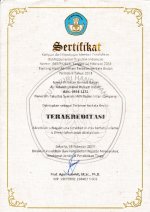Kafâ’ah Contextualization in an Effort to Form Harmonious Family in the Modern Era: An Analysis Of Fazlur Rahman's Double Movement
Abstract
Kafā’ah is a marriage law that has relatively little attention from Islamic jurists. This is because kafā’ah is less adaptable to changes in people's lives. Because kafā’ah is identical with the Arab cultural heritage before Islam. But factually this kafā’ah is still a legacy in the books of the fuqaha'. This research is focused on revealing the relevance of the concept of the kafā’ah of the fuqaha' with the changing times of the modern era. As well as how to contextualize the concept of kafā’ah in this modern era so that it truly becomes a path to family harmony. In uncovering the problem, the double movement theory or Fadzlurrahman dual interpretation is used, in which this interpretation becomes the knife of analysis by revealing how the current condition of the kafā’ah is then drawn to the kafā’ah of the past and how the response of the Qur'an and the Sunnah. Then the moral values of the Qur'an and the Sunnah are taken using reasoning ratios so that conclusions can be drawn in accordance with current needs. The conclusion of this research is that the concept of kafā’ah in the book of fiqh is not relevant to the needs of this modern era, where kafā’ah in the modern era is more interpreted in terms of equality and ability (competence) to get married, which is different from the kafā’ah of the past which is more nuanced feudalistic.
Keywords
Full Text:
PDFReferences
Abdul Manan, Reformasi Hukum Islam Di Indonesia. Jakarta: Raja Grafindo Persada, 2006.
Abdurrahman, Kompilasi Hukum Islam Di Indonesia. Banjarmasin: Akademika Pressindo, 1992)
Assegaf, M. Hasyim, Derita Putra-Putri Nabi. Bandung: Remaja Rosda Karya, 2000.
Abu Zahrah, Muhammad, Al-Ahwâl al-Shakhsîyah. Mesir: Dâral-Fikr wa al-‘Arabî, 1369.
Abd al-‘Ati, Hammudah, The Family Structure of Islam, Terj. Anshari Thayib, Keluarga Muslim. Surabaya: Bina Ilmu, 1984.
Abdul Aziz, Jamal, ‘Teori Gerak Ganda (Metode Baru Istinbdt Hukum Ala Fazlur Rahman)’, Hermenia, 6.No. 2 (2007), 329–49.
Basri, Hasan. Merawat Cinta Kasih. Yogyakarta: Pustaka Pelajar, 1996.
Barry, M, What Skills Will You Need to Succeed in the Future? Phoenix Forward (Online). University of Phoenix: Tempe, AZ:, 2012.
Dubois, D., Rothwell, J. W, Competency Based Human Resource Management. Davies-Black Publishin, 2004.
Fazlur Rahman, Islam and Modernity: Transformation of an Intelectual Tradition. Chicago & London: The University of Chicago Press, 1982.
———, Kebangkitan Dan Pembaharuan Di Dalam Islam. Bandung: Pustaka, 2001.
Frinces, Heflin, Globalisasi Respon Terhadap Krisis Ekonomi Global. Yogyakarta: Mida Pustaka, 2009.
Hermanto, Edi, ‘Implementasi Teori Tafsir Gerak Ganda Fazlur Rahman Pada Buku Ajar Al-Qur’an Dan Hadist’, An-Nida’, 41.1 (2018), 31–49.
H.S.A Al-Hamdani, Risalah Nikah (Hukum Perkawinan Islam I), Jakarta: Pustaka Amani, 1989.
Imam Suprayogo dan Tobroni, Metodologi Penelitian Social-Agama, Bandung: PT Rosda Karya, 1998.
Lapidus, Ira M. A History of Islamic Societes, Terjemahan Ghufron A. Mas’adi, Sejarah Sosial Ummat Islam, Jakarta: PT Raja Grafindo Persada, 2000.
Levy, Reuben, The Social Structure of Islam. Jakarta: Pustaka Firdaus, 1986.
Malibary, Zainudin al-, Fathu Al-Mu’in. Beirut: Dar al-ihya’al Kitab al-‘Arabiyah, t.t.
Manzur, Jamal al-din Muhammad ibnu Mukarram al-Ansari al-, Lisan Al-‘Arabi. Mesir: Dar al Misriya, t.t.
Mustafa, Ibrahim, Al-Mu’jam al-Wasith. Dar al-Da’wah, t.t.
Maunah, Binti, ‘Stratifikasi Sosial Dan Perjuangan Kelas Dalam Perspektif Sosiologi Pendidikan’, Ta’allum: Jurnal Pendidikan Islam, 3.1 (2015), 19–38 .
Mishri, Muhammad bin Mukram bin Mandzur al-Afriqi al-. Lisan Al-‘Arab, Beirut: Dar al-Sadr, t.t
Muttaqin, Labib, ‘Aplikasi Teori Double Movement Fazlur Rahman terhadap Doktrin Kewarisan Islam Klasik’, Al-Manahij: Jurnal Kajian Hukum Islam, 7.2 (2013), 195–206 .
Nasution, Khoiruddin, Hukum Perkawinan I. Yogyakarta: Academia, 2004.
———, Islam Tentang Relasi Suami Dan Istri. Yogyakarta: ACAdeMIA : Tazzafa, 2004.
Qaimi, Ali, Menggapai Langit Masa Denpan Anak. Bogor: Cahaya, 2001.
Sibâ’î, Mustafa al-, Sharh Qânun Al-Ahwâl al-Shakhsîyah. Damaskus: TNP, 1385.
Syarief, Rachman, Kepemimpinan Transformasional Dan “U Theory” Di Pendidikan Tinggi Dalam Menyongsong Pasar Bebas Asean. Metro: Universitas Muhammadiyah Metro, 2014.
Sanghi, S, The Handbook of Competency Mapping: Understanding, Designing and Implementing Competency Models in Organization. Sage Publication Pve, Ltd, 2007.
Sarwono, Sarlito Wirawan, Menuju Keluarga Bahagia 4. Jakarta: Bhatara Karya Aksara, 1982.
Sabiq, Sayyid, Fiqh Sunnah. Bandung: Al-Ma’arif, 1993.
S.N. Eisentadt, Modernization: Protest and Change. Prentice Hall Inc, Englewood Cliffs, 1966.
Soekanto, Soerjono, Sosiologi Suatu Pengantar, V, Jakarta: CV. Rajawali, 1985.
Sri Suhardjati dan Ridin Sofwan, Perempuan Dan Seksualitas Dalam Tradisi Jawa. Semarang: PSW IAIN Walisongo kerja sama dengan Gama Media, t.t.
Syukri, Ahmad, ‘Metodologi Tafsir Al-Qur'an Kontemporer dalam Pemikiran Fazlur Rahman’, Kontekstualita: Jurnal Penelitian Sosial Keagamaan, 20.1 (2005), 37111.
Wagner, Overcoming The Global Achievement Gap (Online). Cambridge: Harvard University, 2010.
Zaelani, Abdul Qodir, ‘Pembaruan Hukum Keluarga: Kajian Atas Sudan – Indonesia’, Al-’Adalah, 10.1 (2012), 331-342.
-------, ‘Konsep Ta’aqquli Dan Ta’abbudi Dalam Konteks Hukum Keluarga Islam’, Asas, 6.1 (2014), 46-56.
DOI: http://dx.doi.org/10.24042/adalah.v17i2.6568
Refbacks
- There are currently no refbacks.
Copyright (c) 2020 AL-'ADALAH
Al-'Adalah is licensed under a Creative Commons Attribution-ShareAlike 4.0 International License.


1.png)

.png)
_(1).png)
_(1).png)

.png)
